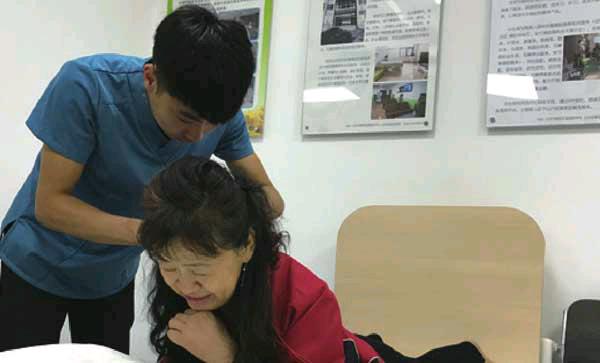A Helping Hand
2016-12-21ByMaLi
By+Ma+Li
Every morning at 9 oclock, Song Enlan, who works at the Huixinyuan Community in Beijings Chaoyang District, arrives at Warm Homeland, a center for the recovery of people with disabilities in Xiaoguan Subdistrict of Chaoyang. Her daily routine starts by greeting her friends who come for recovery training.“Ive been here for almost two years, and I feel fulfilled by helping them and seeing them making improvements every day.” The 49-year-old Song has made her work in assisting persons with disabilities one of the most integral parts of her life.
There are currently 886 people with disabilities on record in Xiaoguans Warm Homeland—479 with physical disabilities, 122 with psychological problems, 72 who are mentally challenged, 55 who are hearing impaired, 94 who are visually impaired and 64 suffering from multiple disabilities. Some of the patients require a long time to recover after being treated in hospital. And the center provides the optimum environment for them to do this. The work of Song and her colleagues becomes essential.
Giving hope
You would never associate Wei Xing with disabilities if you hadnt seen her at the center.“Im really happy. Ive been here for almost two years and I feel like Ive become another person. I hope to return to society as soon as possible and start anew.” No one could imagine the pleasant woman has had severe psychological issues.
In 2000, Wei, who was then 25, moved with her then husband to the capital. “At that time, I had recently graduated from college and had a decent job before I went to Beijing. But I quit my job and came here with great hope to support my husband in his career.”
Unfortunately, the reality was not as good as she had imagined. “The first problem was employment. I thought I could find a decent job in Beijing, but failed. I started to doubt my choice,” Wei said. She added that being unable to find a satisfying job seriously affected her.
“My husband wanted a divorce after our child was born because he had begun a relationship with another woman.” Quitting her job in her hometown and being abandoned by her husband completely destroyed her.
“After the divorce I stayed at home alone and became absentminded. Sometimes I couldnt tell whether it was day or night. I didnt want to go out and was afraid of seeing other people,” Wei said, adding that she lived as a recluse in extreme anger and fear during those years.
Weis psychological condition was discovered when a household survey on people with disabilities in the community was taken two years ago. The staff persuaded Wei to go outside her apartment and brought her to the center.
“At first, Wei just sat there and was unwilling to communicate with the trainers or other members. So we talked to her and encouraged her to sing, dance and play games in order to regain her confidence and shake off her introverted nature. She will be able to start afresh only if she becomes more extroverted,” Song said.
Over the last two years, Wei has gradually became more outgoing and active through psychological counseling and therapeutic intervention provided by the recovery trainers. “Now I only need to take some basic medicine. Im hoping to rid myself of this some day, return to society and start a new life,” Wei said.
Warm Homeland holds various recovery activities for the psychologically and mentally challenged. The center hires professional trainers and volunteers from Lead, a social organization which holds all kinds of activities during the week: showing a film on Monday, a drawing class on Tuesday, organizing a choir on Wednesday, paper-cutting on Thursday and performing comedy on Friday.
Each month, trainers from Lead also take some of the attendees out to foster a greater connection with society and nature, such as trips to climb mountains and walking competitions in Beijing Olympic Park.
Specialized doctors conduct psychological recovery every month and give psychological counseling to those who need it. An expert is invited every season to give lectures on psychological recovery.
Sound recovery
“Happy lives are alike, while miserable lives are different,” said Han Jun, a 52-year-old born with infantile paralysis. “A few years ago I was able to walk a little, but later on I couldnt walk anymore and my vision deteriorated.”
Every time he goes to Warm Homeland, Han is taken by friends in his wheelchair.“In the past, I was able to walk around the neighborhood. But after it became difficult to do so, I stayed at home. I feel sorry for my mother who is now 75 years old and has to take care of a son with disability. My mother and I used to stare dully at each other day in day out. It was a desperate time back then.”
In the past two years, he has met new friends and gradually his mood has improved. He also underwent regular treatment, which helped to strengthen his weak limbs. “In the past, when I was home, I felt my life was wasting away. But now, I read, write and draw with others, and life is full of fun.”
Like Han, many others with physical disabilities in the neighborhood are getting better through treatment provided at Warm Homeland. The most critical thing is for them to recover in their minds. Psychological recovery is often far more important than physical recovery.
Song said that the Xiaoguan Sub-District Office has signed a contract with the Third Affiliated Hospital of Beijing University of Chinese Medicine. Doctors are assigned by the recovery center of the hospital to provide professional services to people with disabilities in the local community regularly. For 30 people with specific recovery needs, Xiaoguan has established a home-based recovery training camp, providing them with one-on-one services.
